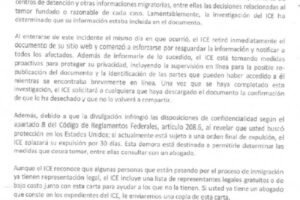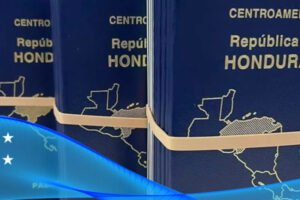Advantages and Disadvantages of Political Asylum in the U.S.

Seeking political asylum in the United States is a legal route that allows individuals of various nationalities, including Hondurans, to obtain protection and eventually residency in the event of persecution or a well-founded fear of persecution in their country of origin due to race, religion, nationality, membership in a particular social group, or political opinion.
Analyzing the advantages and disadvantages of this process is crucial to understanding its impact on the lives of applicants and on U.S. society.
Advantages of Political Asylum
Political asylum in the United States is not just a legal label; it is a vital safeguard that provides tangible and transformative benefits. Let’s take a closer look at each of these advantages:
Safety and Security Guaranteed
The most immediate and essential advantage of political asylum is the protection it offers. In granting asylum, the United States is committed to safeguarding the integrity and human rights of asylees. They are guaranteed that they will not be returned to situations where their life or freedom would be threatened. This protection is shaped by international treaties and domestic legislation, such as the Immigration and Nationality Act (INA).
Employment Opportunities and Self-Sufficiency
Once asylum is granted, individuals have the right to obtain a work permit. This is crucial for self-sufficiency and integration into U.S. society. Having the ability to work legally opens up a world of opportunities for asylees, allowing them to contribute to the economy and improve their quality of life.
Educational Benefits
Asylees in the United States can access public education and often higher education under the same conditions as permanent residents and citizens. This means that children and young adults can continue their education, which is a fundamental pillar for personal and professional development.
Family Reunification
Asylees have the opportunity to apply for reunification with immediate family members through the relative petition (Form I-730). This means that they can bring their spouses and unmarried children under the age of 21 to the United States, which is an emotionally and psychologically beneficial aspect for the asylee.
Access to Citizenship
One of the long-term advantages of asylum is the path to U.S. citizenship. Within one year of being granted asylum, an individual may apply for permanent residency (green card) and, five years after obtaining residency, may apply to become a U.S. citizen.
Social Support and Assistance
In some cases, asylees may be eligible for social assistance and support programs including, but not limited to, medical assistance, food assistance and housing assistance programs. Although this varies and may depend on state and local laws, social assistance helps asylees in their initial transition.
Cultural Contribution and Diversity
In addition to the direct benefits to asylees, their presence enriches the social fabric of the United States.
They bring cultural diversity, unique perspectives and contribute significantly to the country’s economy and culture.
Political asylum in the United States offers a safe haven and a springboard to a life of opportunity and meaningful contributions to both asylees and U.S. society.
Disadvantages of Political Asylum in the United States
While political asylum offers important safeguards, it is also accompanied by significant challenges. The following are the disadvantages associated with the asylum process and status in the United States.
Complexity of the Legal Process
One of the major disadvantages is the complexity of the asylum application process. U.S. immigration law is notoriously intricate, and navigating it without legal advice can be overwhelming.
Applicants must provide substantial evidence to demonstrate their fear of persecution, which may be difficult if they fled without documents or physical evidence. In addition, any errors in the application may result in significant delays or denial of asylum.
Extended Waiting Time
Delays in processing asylum applications are common, leading to a prolonged state of uncertainty. During this time, applicants may face financial hardship, especially if they have not yet been granted permission to work.
Psychological and Emotional Stress
The asylum process can be an emotionally draining journey.
Uncertainty about the outcome, the possibility of deportation, and separation from family can profoundly affect the mental well-being of applicants.
This tension is compounded by the possibility of detention during the application process.
Initial Employment Limitations
Although asylum seekers can eventually obtain work permits, there is a mandatory waiting period before they can apply, which can put individuals in a precarious financial situation and limit their ability to be self-sufficient.
Obstacles to Social Integration
Even after asylum is granted, asylees may face significant barriers to social and economic integration.
Language barriers, lack of recognition of foreign credentials, and discrimination are common problems that can prevent asylees from reaching their full potential in the United States.
Stigmatization and Xenophobia
Asylum seekers may be stigmatized because of their status or because of prejudice against immigrants.
Xenophobia and discrimination can be everyday realities that make it difficult to adapt and feel a sense of belonging in a new community.
Policy Instability
Asylum policies are subject to change with the government administration of the day, which can affect the prospects of applicants.
Political changes may alter the accessibility of asylum, leaving applicants in legal limbo.
Associated Costs
The costs associated with the asylum process in the United States can be significant and vary depending on a number of factors. The following are the main costs that applicants may incur:
Legal Fees
The services of an immigration and asylum attorney can be expensive. Fees vary widely, but can range from several thousand dollars, depending on the complexity of the case and the length of the process. Some attorneys may charge a flat fee for representation in the case, while others may charge by the hour.
Application and Processing Costs
Although there is no fee for filing the asylum application itself (Form I-589), there may be costs associated with obtaining necessary documents, such as passports, birth certificates, medical evidence, certified translations, and document mailings.
Medical Expenses
Asylum seekers may need to undergo medical examinations as part of their residency application process after obtaining asylum.
These examinations, performed by physicians authorized by the U.S. Citizenship and Immigration Services (USCIS), have a cost that must be covered by the applicant.
Price of Life During the Process
Asylum seekers may face months or years of waiting before receiving a decision. During this time, they must cover their living costs such as housing, food and transportation without initially having permission to work in the U.S., which can be financially demanding.
Family Reunification Payments
If the applicant seeks to reunite with his or her family through the family petition process (Form I-730), there may be costs associated with the visa, travel, and relocation of family members.
Work Permit Fees
Although the work permit itself (Form I-765) may be free for asylum seekers, there may be costs involved in obtaining the necessary documents for the permit.
Integration Expenses
Once asylum is granted, additional costs related to integration may arise, such as English classes, skills and education certification, and expenses for cultural adaptation.
Possible Appeal Costs
If the asylum application is denied and the case is appealed, this may generate additional legal costs, as well as possible court and processing fees.
It is crucial for asylum seekers to be aware of these costs and to seek support through non-governmental organizations and pro bono legal services that can often offer assistance. Despite these costs, the protection and opportunities offered by asylum can make the process worthwhile for those facing persecution in their home countries.
Health Impact
Difficult living conditions, both before and during the asylum process, can have lasting consequences on the physical and mental health of applicants.
These disadvantages illustrate the multifaceted challenges faced by asylum seekers in the United States.
Seeking international protection is an arduous and often tortuous undertaking that requires considerable fortitude and endurance.
Understanding these disadvantages is essential to inform both public policy and community support for asylees.







